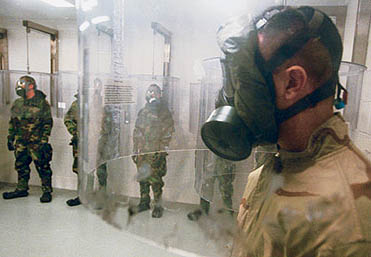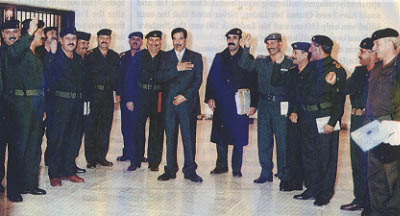since February 11, 2003
|
|

At the highest levels of the U.S. government, officials seriously believe this sequence of events is possible. No one knows for sure whether Saddam possesses smallpox, and no one is sure he would actually try to use it. The Iraqi regime insists that it does not have any weapons of mass destruction, including biological ones. But the Bush Administration is sufficiently worried about a possible smallpox attack against the forces set to invade Iraq that last month it ordered vaccinations for 500,000 frontline military personnel. Beneath the Administration's confidence that a war with Iraq can be won quickly with limited U.S. casualties lurks an anxiety about the catastrophic events an invasion might trigger. "We can overthrow Saddam Hussein, no doubt about it," says a Central Command planner. "The question is, Can we do it and keep his weapons of mass destruction bottled up at the same time?" The answer to that, warns Saddam's eldest son, is no. "If they come," said Uday Hussein last week, "Sept. 11, which they are crying over and see as a big thing, will be a real picnic for them, God willing." The President and his strategists like to affirm that disarming Iraq is central to the war against terrorism. But that means the risk of retaliation against Americans is not confined to the battlefield. Faced by the difficulty of outfitting missiles with chemical and biological warheads, Saddam may conclude he will have better luck setting up terrorist free-lancers with unconventional weapons to use against innocents outside the theater of war. A Rand Corp. report estimates that a smallpox attack carried out by teams of special-ops troops on the 10 largest U.S. airports could infect between 5,000 and 100,000 people. In the meantime, U.S. military and counterterrorism officials are concerned that al-Qaeda may be preparing to take advantage of a crisis by staging attacks on Israeli and Western targets, including strikes inside the U.S. "If I were an al-Qaeda type, and I had a plan even halfway in the can for something major," says a senior U.S. intelligence official, "I would try to accelerate it as much as I could." Even as Bush Administration officials privately brace for the worst, they have been hesitant to raise public alarms about the possibility of terrorist retaliation. But others are less restrained. Last week British Prime Minister Tony Blair said an al-Qaeda attack in Britain is "inevitable." According to the New York Times, U.S. officials believe that Islamic militants arrested in London early this year for allegedly manufacturing ricin -- a castor-bean-derived poison that Saddam may also possess -- may have been plotting to tamper with food served to British troops at least at one nearby base. Because threats like these no longer seem remote, they can't be discounted. So U.S. strategists are scrambling to answer the following questions: WILL SADDAM RETALIATE?  On the eve of the first gulf War, U.S. Secretary of State James Baker issued a warning to Iraqi Foreign Minister Tariq Aziz: If Iraq attempted to use unconventional weapons against allied forces, the U.S. would proceed to Baghdad and destroy Saddam's regime. Though the Iraqis used chemical weapons against Iranian forces and rebellious Kurds, Baker's promise was enough to persuade Saddam to hold back during Desert Storm. Now that the current Administration has declared that regime change is its goal, he may not feel so gun-shy. Western military officials and longtime Saddam watchers suggest he won't uncork his deadliest weapons if he calculates that he can survive the U.S. onslaught. "Survival is his objective," says a British official. But he knows that if the U.S. launches an attack, he is target No. 1. Says a senior U.S. intelligence official: "There's absolutely no doubt that Saddam will try to open up every terrorist front he can." CAN WE STOP HIM? Once the war begins, the U.S. will scour Iraq's towns, skies and highways for signs of preparation for an unconventional attack. Any movement of forces to warehouses suspected of containing weapons of mass destruction will be promptly attacked. But Pentagon officials admit that they will need help finding Iraq's stores of deadly agents before they are put to use. "When they're hiding it, you need someone to come forward and tell you where it is," says General Richard Myers, Chairman of the Joint Chiefs of Staff. U.S. strategists are hoping that if defeat appears inevitable, Saddam's scientists will start talking and his generals will disobey his orders to launch unconventional weapons. But that's just a hope. A senior Arab diplomat predicts that if Saddam intends to use chemical or biological weapons, the U.S. won't be able to stop him. "It will be a dirty war," the diplomat says. HOW MUCH DAMAGE CAN HE DO? Attempting to use chemical and biological weapons is one thing; successfully delivering them is another. Iraq will probably tip short-range missiles and artillery shells with deadly substances and lob them against invading U.S. forces. But American front-line troops, inoculated and wearing heavy protective gear, will probably overrun Iraqi positions quickly, thus limiting the potential for large casualties. The Iraqis may instead try to target less protected U.S. bases and Israeli cities with longer-range missiles, but that may not work any better. Military experts say Iraq's warheads are not advanced enough to disseminate their payload before impact, which destroys much of their lethal contents. Allied planners are tracking Iraq's efforts to convert training jets into "drones of death" carrying tanks of liquid anthrax that could be sprayed over Israel. Military experts are confident the U.S. and its allies could shoot down such slow-moving planes before they pose a danger to civilians. "One of the reasons invasion is a plausible option is precisely because Iraq is so weak," says Gary Samore, who headed the National Security Council's nonproliferation policy in the Clinton Administration. "It has very few credible options for causing mass casualties." But those few are harrowing. Administration officials
cite the thousands of tons of chem-bio agents the Iraqis have
never accounted for, including huge quantities of anthrax, botulinum
toxin, aflatoxin and ricin. "If you think about the devastation
that would be wrought by biological weapons," says Myers,
"in some scenarios, it could be as devastating or more devastating
than a nuclear weapon." Since trying unsuccessfully to strike U.S. embassies around the world during the Gulf War, Iraq has largely got out of the international terrorism business. But that raises the possibility that Saddam will try to pass his weapons to terrorist groups like al-Qaeda and Hizballah. WILL WAR INCITE OTHER TERRORISTS? Few things motivate them more. "Terrorist groups are always looking for a context or a way that they can steal some of the limelight when there is ... an international crisis," says Rand terrorism expert Bruce Hoffman. Intelligence and law-enforcement officials agree that as war draws nearer, terrorists will try to "piggyback" on anti-American sentiment and launch fresh attacks. It could happen in unlikely places. The Peruvian Marxist rebel group Tupac Amaru used the first Gulf War as justification to bomb Kentucky Fried Chicken outlets in Lima and in one case also take out an adjacent Pizza Hut. The U.S. has bigger concerns this time around. Since last October, al-Qaeda operatives and other militants have conducted hit-and-run operations against Americans in the Middle East, killing seven in a series of ambushes. Gunmen opened fire last week on an SUV near the U.S.'s Camp Doha in Kuwait, killing a civilian Defense Department contractor. With the U.S. pouring much of its war-fighting resources into removing Saddam, al-Qaeda may decide that this is the best opportunity to strike back at the U.S. homeland. The Administration has long maintained that crushing Saddam and liberating the Iraqi people would be a powerful disincentive to anti-American forces in the Islamic world. But Arab analysts think the opposite reaction is just as likely. "This is only the beginning. America is throwing oil on the fire," says an Arab diplomat. "An invasion of Iraq will bolster the arguments of the extremists, who claim that there is no solution other than extremism." Israeli intelligence officials believe that a war would prompt Hamas and Islamic Jihad to set in motion a new wave of suicide bombings.
Despite the modest strides made in strengthening homeland security since Sept. 11, the U.S.'s protective net is still porous, and it will take years to plug the holes adequately. The Administration last week disclosed plans to deploy environmental sensors in several U.S. cities. The monitors are designed to detect unusual quantities of deadly germs in the air but can't spot smallpox released in such covered areas as shopping malls and airports. U.S. law-enforcement officials have begun interviews of 50,000 Iraqi green-card or visa holders, others with special links to Iraq and some Iraqi-born U.S. citizens. But so far, officials say, they haven't had any luck in thwarting possible terror plots. "There are some we have concerns about," says an official. "Part of it is just to let people know that we're aware and we're watching." With the moment of truth rapidly approaching, the U.S. may not have time to do much more than that. Reported by Timothy J. Burger, Massimo Calabresi
and Mark Thompson/Washington, J.F.O. McAllister/London and Scott
MacLeod/Cairo |